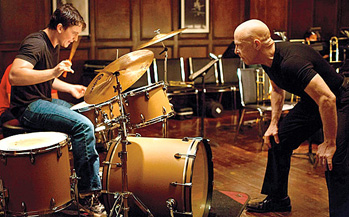The 400-Word Review: Whiplash
By Sean Collier
November 17, 2014
BoxOfficeProphets.com

Andrew (Miles Teller) is a first-year drummer at a prestigious collegiate conservatory. The school’s notorious top dog of a conductor, Fletcher (J.K. Simmons) catches him toiling in a rehearsal room; Fletcher briefly engages the freshman before unceremoniously vanishing. Within a few days, however, Andrew is whisked to the school’s top ensemble, where Fletcher’s admiration comes in the form of near-constant psychological and physical abuse.
Andrew begins practicing himself into a frenzied and bloody competence, but begins to buckle under the anxiety imposed by his Machiavellian instructor. The farther he climbs the ranks, the more insidious Fletcher’s assaults become; to the audience, Andrew’s obsession passes swiftly into insanity.
A second or third viewing of Whiplash will reveal a great deal of below-the-line wizardry, from brilliant sound editing that provides percussion in times of success and static in times of failure to beautifully-photographed images of an artist in struggle. But the fight between teacher and student will be the only thing visible to the first-time viewer; key sequences have the feel of a horror-movie climax rather than a dramatic tête-à-tête. While the tight script is interrupted briefly by a romantic subplot that feels underwritten at best and tacked-on at worst, one can’t look away from the struggle at the heart of Whiplash.
Credit for this mayhem should be split between Chazelle, also the film’s screenwriter, and its stars. Teller, who has shown his skill in films such as The Spectacular Now while being forced to hide it in the likes of That Awkward Moment, is almost gleeful in deconstructing his natural charm. Simmons, one of the most gifted and under-utilized character actors working today, is unforgettable and harrowing, giving a guiltlessly likable performance in the service of a vile creation of a character.
In a dinner-table conversation, a more-normal human being asks Andrew if the notion of a music competition isn’t inherently ridiculous; isn’t art subjective, he asks. Andrew’s response is quick: “No.” The audience members who laugh at that response might be put off by Whiplash. For those who agree with Andrew, though, this is their Rocky.
My Rating: 9/10
Sean Collier is the Associate Editor of Pittsburgh Magazine and a member of the Broadcast Film Critics Association. Read more from Sean at pittsburghmagazine.com/afterdark